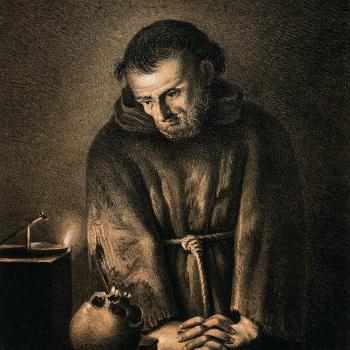
One of my favorite quotations comes from Karl Rahner: “The Christian of the future will be a mystic or will not exist.”
It’s a prophetic statement, from a man who died in 1984. When paired with the demographic realities of the last 30 years (Americans who identify as Christian comprised 85% of the population in 1985, but only 70% of the population today, while the so-called “nones” — people without religious affiliation — grew from 8% in ’85 to 16% today), it’s fair to say that Rahner’s “future” is our “present.” If current trends continue, Christianity could be a minority religion in America by 2075.
Those of us who still believe in the teachings of Jesus — where forgiveness and mercy matter more than law and purity, and love is so central that we are to give it to everyone, even our enemies — are facing a stark choice. Do we embrace the mystery? Or do we just wring our hands while one church after another closes its doors?
I think the answer lies in the writings of the mystics themselves. So for today’s post I’d like to consider the paradox here: Karl Rahner basically said that the key to the faith of the future lies in embracing and following the wisdom of the past. On the surface, that may seem foolish: how can a contemplative or a visionary from the twelfth or fourteenth or sixteenth century speak to the challenges facing Christians (and all people) today?
Here are several ways the spirituality of the past can inspire us to be more faithful here in the present. Perhaps you can think of other ways.
- The mystics call us to be still and know. Contemplation — the prayer of gentle waiting — is the heart of mystical spirituality. It’s the countercultural opposite of our aggressive, can-do culture’s way of managing affairs. Mystics know that Christianity is not about control, but about humility and service.
- The mystics remind us that silence is praise. E. M. Forster described our faith as “poor little talkative Christianity.” The problem is, when we talk too much we get into trouble, because our words too often are words of judgment and condemnation, not mercy and forgiveness. Mystics recognize that silence is not only a way to praise God (and to enter into mystical consciousness), but it is also the key element to “loving our neighbor” which begins with listening.
- The mystics know that the poor and the forgotten are the Body of Christ. I recently heard Doug King of Presence say that Christianity needs to be less about converting others, and more about the contribution we can make to others’ well-being. It sounds like something Jesus himself would have said. Jesus felt that religion worked best when it involved caring for the most vulnerable members of society: the poor, the outcast, the elderly, the sick, the vulnerable, the imprisoned. Mystics from Catherine of Siena to Evelyn Underhill to Simone Weil embodied this truth. The mystics of the future will too.
- The mystics understand that humility and kenosis are all about loving your enemy. Traditional religious language with its emphasis on humility, strikes many people — including too many Christians — as old-fashioned or dysfunctional. But mystical Christianity recognizes humility not as humiliation but as self-forgetfulness or earthiness. It’s tied in with a lovely Greek word, kenosis, which means “emptiness.” The Christian of the future will embrace emptiness and humility not as a type of low-self-esteem but as a way to find the openness of heart necessary to follow the most challenging of Christian mandates: to love our “enemies” (I put enemies in quotation marks because a Christian understands that he or she has no enemies; still, there are those who may regard us as enemies or adversaries; those are the ones we are called to humbly love).
- The mystics are comfortable with mystery, with unknowing, with not having all the answers. As the Orthodox bishop Kallistos Ware puts it, “It is not the task of Christianity to provide easy answers to every question, but to make us progressively aware of a mystery. God is not so much the object of our knowledge as the cause of our wonder.” Perhaps when Christianity stops being the religion that insists it has all the answers and becomes instead a religion filled with wonder and awe, we can begin to make a real difference in people’s lives — contribution, not conversion.
- The mystics remind us that a miracle can happen at any time. Thomas Aquinas beheld God while saying the Mass; Thomas Merton saw everyone shining like the sun on a busy street corner in downtown Louisville, KY; Julian of Norwich received a series of sixteen visions or showings while deathly ill. We never know when God will touch us with wonder, or a vision, or a call. But we do know that such moments of encounter can change people’s lives — and the world.
- The mystics understood that being faithful matters more than being successful. Christians are called to heal the sick, feed the poor, clothe the naked, visit the prisoner, shelter the homeless, love the enemy, and pray without ceasing. We will most likely fail at all of the above (and then there’s raising the dead!) — but we are not called to be successful, we are called to be faithful. Perhaps one of the reasons why Christianity as we know it is dying, is because it is the end of a 1700-year long run of Christianity asserting itself as a religion of success, of earthly/political power, and of social dominance and control. That enterprise is clearly sputtering out. But that’s good news, because all that’s left is the mystery — the invitation to faithfulness — and the vocation to love.
I don’t think embracing mystical spirituality will halt the implosion of the institutional churches. But I don’t think God is in the empire-building business, anyway — if he were, Jesus would have been born the son of an emperor, not the child of an unwed teen mother.
Make no mistake: in the years to come, we may watch a lot more churches shrivel away to nothingness, see plenty of monasteries close, and find that the nature of ordained ministry or public worship will be changing as well. I don’t think any of these things are going to disappear altogether. But for many Christians, what it means to follow Jesus will look a lot different in the future than it did in the past. And that’s okay. If we are embracing the mystery of God — which is the best short definition of a mystic that I can think of — then I believe we’ll be okay. The Holy Spirit will do the heavy lifting. Our job will be to wonder, to listen, to spend plenty of time in silence, to live and pray generously, and to embody forgiveness and love.
And what an adventure that will be!
Can you think of more ways that the mystics of Christianity can inspire the faith of the future? If so, please leave a comment here or on social media. Thank you.
Enjoy reading this blog?
Click here to become a patron.














